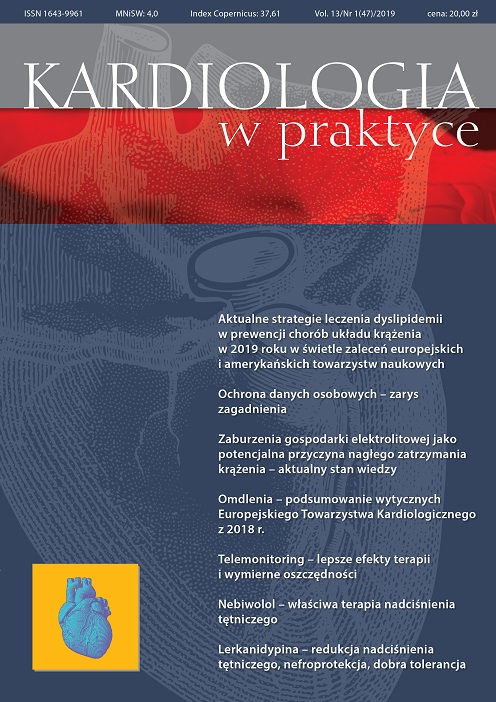Current issues in management of dyslipidemia in the prevention of cardiovascular diseases in 2019 focused on European and North American scientific societies Review
Main Article Content
Abstract
Disorders of lipid metabolism are the most common modifiable risk factor of cardiovascular disease, which in turn is the most common cause of death in highly developed countries. Recent studies on PSCK9 inhibitors: FOURIER and ODYSSEY OUTCOMES trials, demonstrated that lowering LDL-C level below the value recommended to date is associated with improved prognosis in CVD patients. These results were acknowledged in Polish Recommendation for the management of dyslipidemia in Poland e.g. III Declaration of Sopot. Interdisciplinary Expert Position Statement
on the Cardiovascular Pharmacotherapy as well as in American 2018 AHA/ACC/AACVPR/AAPA/ABC/ACPM/ADA/AGS/ APhA/ASPC/NLA/PCNA Guideline on the Management of Blood cholesterol, both published in 2018. Unfortunately, in spite of expert opinions and therapeutical advances, still too few patients meet the target LDL-C levels. More rigorous implementation of recent recommendations in daily clinical practice should improve CVD outcomes.
Downloads
Article Details

This work is licensed under a Creative Commons Attribution-NonCommercial 4.0 International License.
Copyright: © Medical Education sp. z o.o. This is an Open Access article distributed under the terms of the Attribution-NonCommercial 4.0 International (CC BY-NC 4.0). License (https://creativecommons.org/licenses/by-nc/4.0/), allowing third parties to copy and redistribute the material in any medium or format and to remix, transform, and build upon the material, provided the original work is properly cited and states its license.
Address reprint requests to: Medical Education, Marcin Kuźma (marcin.kuzma@mededu.pl)
References
2. Zdrojewski T., Rutkowski M., Bandosz P. et al.: Prevalence and control of cardiovascular risk factors in Poland. Assumptions and objectives of the NATPOL 2011 Survey. Kardiol. Pol. 2013; 71(4): 381-392.
3. Kotseva K.; on behalf of the EUROASPIRE Investigators: Time trends in lifestyle, cardiovascular risk factors and therapeutic management in European patients with coronary artery disease. ESC Congr. 2018, 2018.
4. Baigent C., Landray M.J., Reith C. et al.: The effects of lowering LDL cholesterol with simvastatin plus ezetimibe in patients with chronic kidney disease (Study of Heart and Renal Protection): a randomised placebo-controlled trial. Lancet (London, England) 2011; 377(9784): 2181-2192.
5. Cannon C.P., Blazing M.A., Giugliano R.P. et al.: Ezetimibe Added to Statin Therapy after Acute Coronary Syndromes. N. Engl. J. Med. 2015; 372(25): 2387-2397.
6. Catapano A.L., Graham I., De Backer G. et al.: Wytyczne ESC/EAS dotyczące leczenia zaburzeń lipidowych w 2016 roku. Kardiol. Pol. 2016; 74(11): 1234-1318.
7. Sabatine M.S., Giugliano R.P., Keech A.C. et al.: Evolocumab and Clinical Outcomes in Patients with Cardiovascular Disease. N. Engl. J. Med. 2017; 376(18): 1713-1722.
8. Schwartz G.G., Steg P.G., Szarek M. et al.: Alirocumab and Cardiovascular Outcomes after Acute Coronary Syndrome. N. Engl. J. Med. 2018; 379(22): 2097-2107.
9. Szymański F.M., Barylski M., Cybulska B. et al.: Recommendation for the management of dyslipidemia in Poland – Third Declaration of Sopot. Interdisciplinary Expert Position Statement endorsed by the Polish Cardiac Society Working Group on Cardiovascular Pharmacotherapy. Cardiol. J. 2018; 25(6): 655-665.
10. Grundy S.M., Stone N.J., Bailey A.L. et al.: 2018 AHA/ACC/AACVPR/AAPA/ABC/ACPM/ADA/AGS/APhA/ASPC/NLA/PCNA Guideline on the Management of Blood Cholesterol. J. Am. Coll. Cardiol. 2018: 25709.
11. Chlebus K., Cybulska B., Gruchała M. et al.: Prevalence, diagnosis, and treatment of familial hypercholesterolaemia in outpatient practices in Poland. Kardiol. Pol. 2018; 76(6): 960-967.

